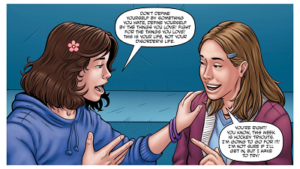Going about the daily business of reducing eating disorder shame
Going about the daily business of reducing eating disorder shame

As we close on this year’s third annual World Eating Disorders Day, it provides us with time to reflect on those affected by an eating disorder, their families, and the medical and health professionals who support them. Although having a day dedicated to raising awareness is a grandiose initiative, it’s not a battle with an overnight solution. Eating disorder warriors, and those affected by other disorders, much like mental health, are plagued by stigma and days of internal defeat year round.
The 2018 #WeDoAct2BreakStigma theme and focus is on taking steps to break the stigma that surrounds eating disorders. In conjunction, May’s Mental Health Awareness month in the United States also took a stand against stigma with their #StopTheStigma campaign. Likewise, former U.S. President Bill Clinton recognized the impact a lack of understanding has when it comes to these disorders when he proclaimed, “Mental health concerns are nothing to be ashamed of, but stigma and bias shame us all.”
As we’ve mentioned before, there are many ways to decrease stigma consistently throughout the year:
Educate yourself and others
“You cannot recover from anxiety by just staying calm. You cannot recover from depression by just being positive. You cannot recover from anorexia nervosa by just eating more. If mental illnesses were that simple we wouldn’t be struggling in the first place.” ― Unknown
Often times it feels as though mental illnesses are treated like physical illnesses which is a false and frustrating judgment to pass. Imagine restricting calories as a symptom of Anorexia nervosa, only to have someone say, “Have you tried, you know, just eating? Or struggling through a depressive episode to which someone replies, “You just need to change your frame of mind, then you’ll feel better.” These disorders cannot be fixed like an antibiotic to an infection. Whether you suffer from a disorder yourself or know a loved one who does, it’s vital to be open to understanding the complexity of these battles. If you know someone who’s suffering from a disorder, educate yourself in order to be a positive presence along their journey.
Talk openly and be resourceful
“The mentally ill frighten and embarrass us. And so we marginalize the people who most need our acceptance. What mental health needs is more sunlight, more candor, more unashamed conversation.” ― Glenn Close
Start by reaching out. Simply asking, “How are you? Is there anything you need or that I can to do?” can make a world of difference. If your friend or loved one insists they want to be alone, don’t force them to open up, but at least make the offer so they know you are there for support when they are ready to talk.
If someone feels uncomfortable talking to you personally, guide them with other options. For instance: The National Eating Disorders Association (NEDA) Helpline in the USA, The Butterfly Foundation in Australia, or BEAT in the UK all have helpline volunteers who are properly trained to provide you with support, resources and treatment options.
If you’re looking to further advocate against stigma, and manage and understand mental health, Jumo Health offers a podcast that spotlights #StopTheStigma by calling attention to the realities of these disorders to help foster more relatable conversations.
Stay actively engaged in breaking the stigma
Take our pledge (with World Eating Disorders Action Day):
I commit to breaking down stigma by sharing the Nine Truths About Eating Disorders and the World Eating Disorders Action Day key messages with others, and to promoting the NINE Goals of Taking Action Against Eating Disorders.
About the author
This article is a collaborative effort by team members at Jumo Health, whose focus is on serving the needs of those affected by medical conditions by providing a suite of digital health resources for children, young adults, and their caregivers. Team members find a sense of unity in empowering children through comic books, podcasts, videos, and games that enable patients to explain medical conditions and share stories of hope in order to provide supportive insights.





